Last Updated on January 23, 2024
When I initially went zero waste, I was a bit shocked how much certain items cost upfront.
Twenty-five dollars for one reusable water bottle? $80 for a set of nesting tiffins? That sounded like so much!
It’s important to remember going zero waste isn’t about buying things! It’s best to reuse what you have.
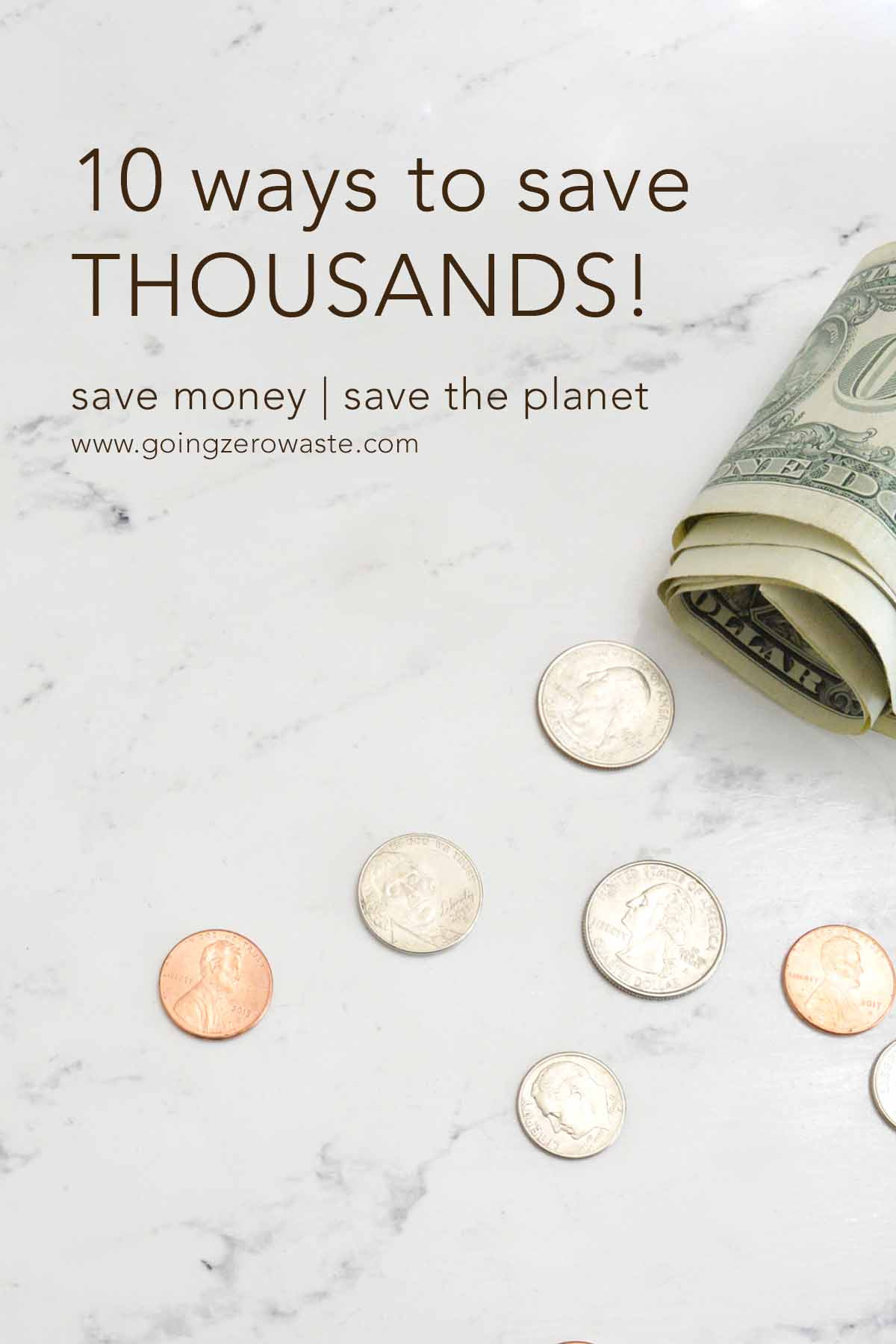
Check out this post on how to start going zero waste even when you’re on a tight budget.
But quickly, I discovered how fast reusables paid for themselves.
That single twenty-five-dollar water bottle has saved hundreds of plastic water bottles from ending up in the environment, and saved me hundreds doing it.
I started to view purchasing reusable items as an investment and, man, did that pay off.
In no time at all, I was saving more money than ever before.
So if you want to save money, go green. Here’s a bunch of ways you can save money and the planet. Yay!
Table of Contents
invest in reusables:
Reusables, like that twenty-five-dollar water bottle I mentioned earlier, can be kind of pricey. But that’s because they’re built to last.
Reusable items are a one time purchase, and make sure to keep that in mind.
You’re only going to buy this item once so think of it like an investment for your future.
You can continue to purchase something cheaper, over and over again.
Or, you can purchase something once that will last you years. The choice is yours, but you know which will benefit you (and the planet!) in the long run.
There are so many reusable items that can replace money draining single use items.
Here’s a full list of zero waste swaps you should consider making that will save you money down the road.
Personally, I recommend starting off with the big four: Plastic bags, plastic water bottles, straws, and takeaway coffee cups.
These are all items you should seek to replace first, since they tend to generate the most immediate waste.
There’s also plenty of other disposable products to replace with reusables.
Paper towels and napkins are huge money drainers and can be replaced with rags, cloth towels or cloth napkins.
Also, constantly purchasing disposable plates and cups will drain your cash really quick too – just use whatever plates and cups you have at home instead.
It actually wastes more water to make paper plates and cups than it does to wash their reusable counterparts.
If you get your period, investing in reusable feminine products will save you TONS down the line. My personal favorite reusable menstrual products are Thinx period panties.
I tried, reviewed, and compared every one of Thinx styles so you don’t have to!
Period underwear, reusable pads and menstrual cups are all great options that you only have to purchase once and they last you years.
Also, you don’t necessarily have to spend money on reusable items at all. You can simply use whatever products you have in your home already.
They don’t necessarily have to be “grammable” to get the job done.
Have old promotional canvas totes? Use those! Still have ziplocks? Just re-wash and reuse them over and over again.
Zero waste living doesn’t have to be pricey.
Just start out using what you have and save up for the more “grammable” items later down the line – but only if they’re worthy investments!
Related: 8 FREE Zero Waste Swaps
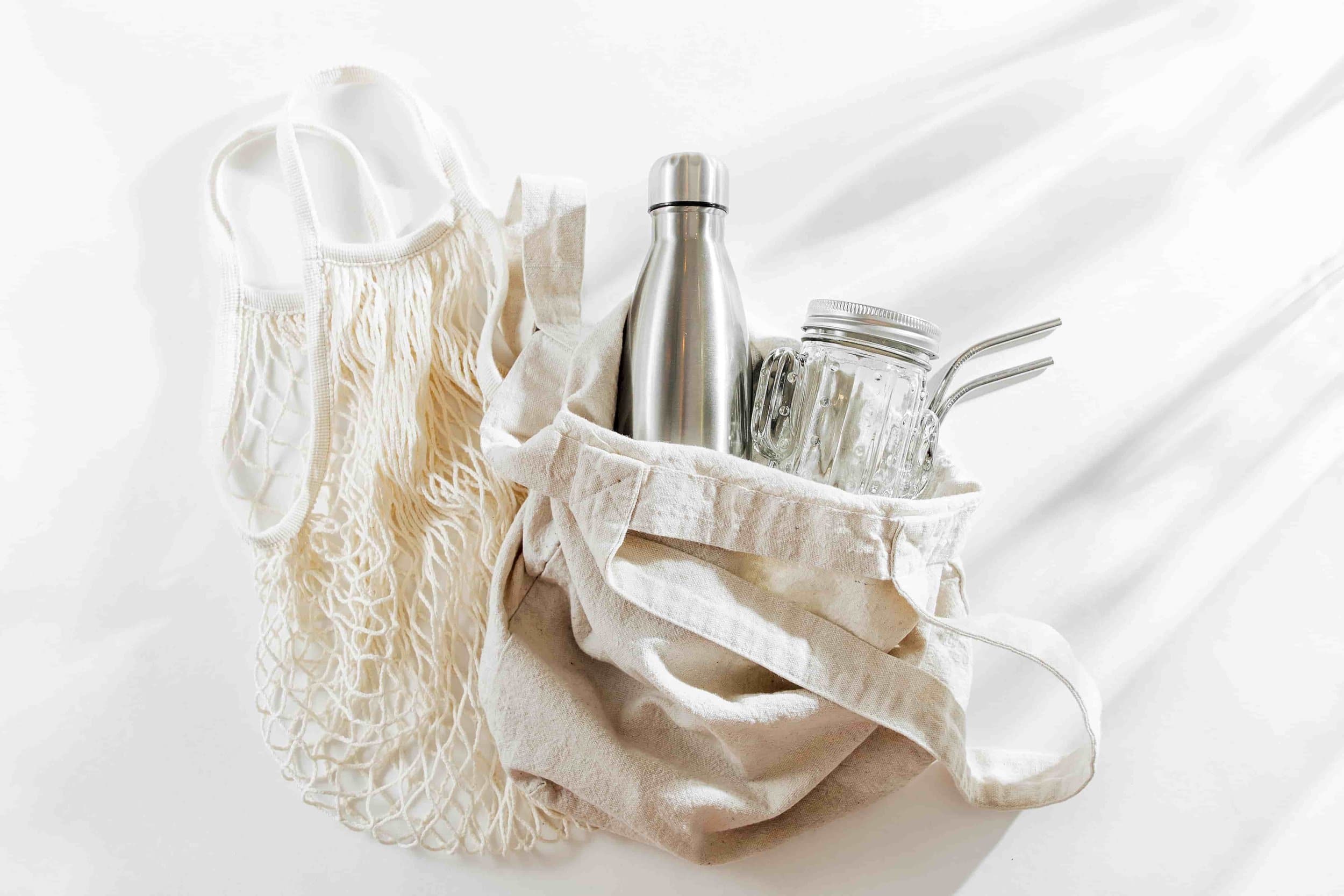
be smart with energy:
Want to save a buck on your electric bill? Going green can certainly help.
For starters, do yourself a favor and shut off any electronic when not in use.
Yes, this also means unplugging it too, so no energy leaks through.
The average American home has 40 electronics drawing power in off or standby mode, totaling in almost 10 percent of residential electricity use. Isn’t that insane?
To make it even worse, households spend $200 or more every year on plugged in devices that aren’t even in use. These electronics are called vampire appliances!
Even when your electronics are “off”, TVs, cable boxes, WIFI routers, electronic equipment and computers continue to draw electricity all day.
A good way to combat this is to put all your major electronics on a power strip and shut them totally off at night or when you leave the house.
Also, make sure to turn off the lights when you’re in a room with nice natural lighting, or when you leave a room.
Similarly, make sure to shut off your computer and monitor when you’re done using them.
There’s no reason to leave it on, especially overnight.
Make sure to unplug your cell phone when it’s done charging, and the same goes for laptops – don’t leave it on the charger!
Aside from looking out for energy appliances, it’s also a good idea to buy energy star products whenever possible.
These products will draw the least amount of energy, so look for this label on any big electronics you bring into your home.
Also, be sure to contact your utility provider and determine your energy consumption habits.
Perhaps, together, you can work on a more budget friendly energy plan that doesn’t harm your wallet, or the environment.
Better yet, consider switching over to sustainable, renewable energy.
If you make the switch to solar or wind power, you’ll see savings on your energy bill over time.
Related: 5 Ways to Reduce Your Carbon Footprint

reduce food waste:
One of the best things you can do for the environment is reducing food waste.
Oh, and it’ll be good for your wallet too.
Did you know 40 percent of food in America is wasted? That’s a lot of money down the drain!
How does this happen, you ask?
Well, let’s say you go to the grocery store and buy two cartons of organic strawberries for $8 each.
But, you forget about them in the back of the fridge and they mold up. Well, that’s $16 you just tossed into the trash.
Not only is it bad for your wallet, but it’s also bad for the planet.
Food that goes to a landfill generates methane gas, a powerful greenhouse gas 30 times more potent than carbon dioxide.
It’s a huge contributor to climate change.
Reducing the amount of food you waste is essential to saving money, and saving the planet.
I recommend creating a grocery list and a meal plan.
Also, doing some meal prep ahead of time can help prevent it from going to waste too.
Whatever you can’t finish should always be composted. This includes leftovers and the parts of plants you don’t eat (like the tops of strawberries or banana peels).
Consider checking out my ebook, How to Reduce Food Waste, to learn exactly how to top wasting food and start saving money.
Related: 7 Ways to Avoid Food Waste
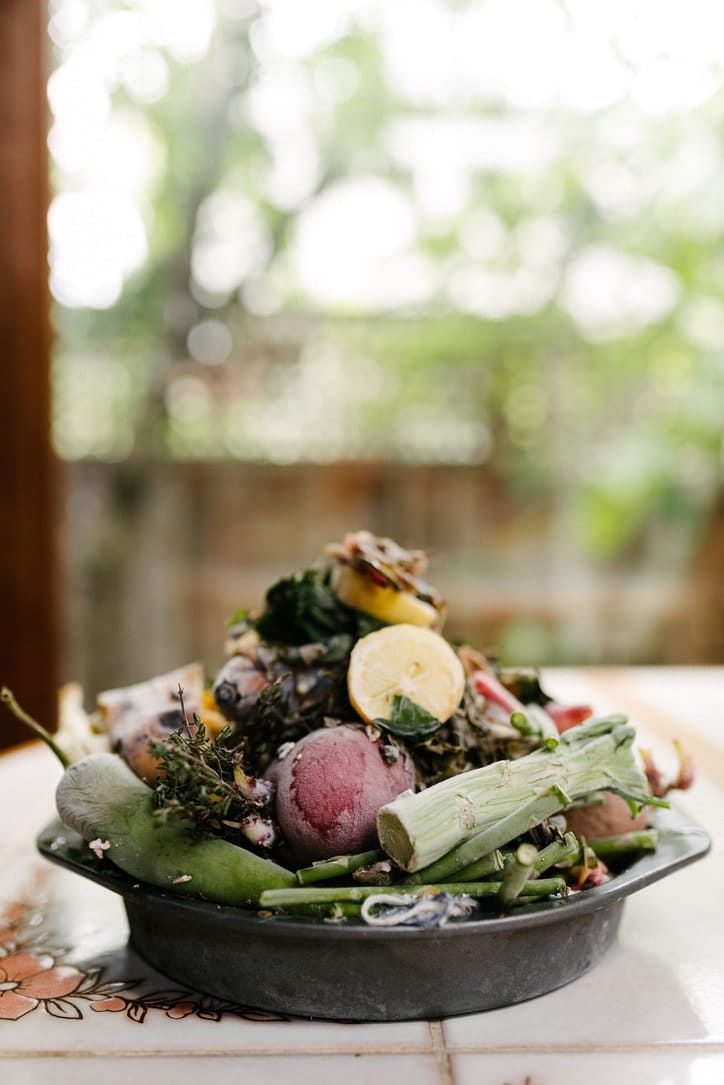
start a garden:
Growing your own food can save you a surplus of cash! Plus, it’s extremely rewarding.
When you grow your own food, you cut back on the amount of food you have to go out and buy.
Just one prolific cucumber plant can feed you enough cucumbers to last all summer long!
Buying seeds is also relatively cheap, and you can probably pick up some free compost at your local farmers market.
My farmers market gives it out every few weeks, in exchange for people providing them with a surplus of food scraps.
You can use low-cost methods to care for your garden too, such as grinding up egg shells to use as fertilizer, or using pine needles as mulch.
The possibilities are endless.
Gardening is such a healthy pass time that connects us back to the earth and the very food we eat. It’s also a great activity to get kids involved in!
Related: How to Grow an Edible Windowsill Garden
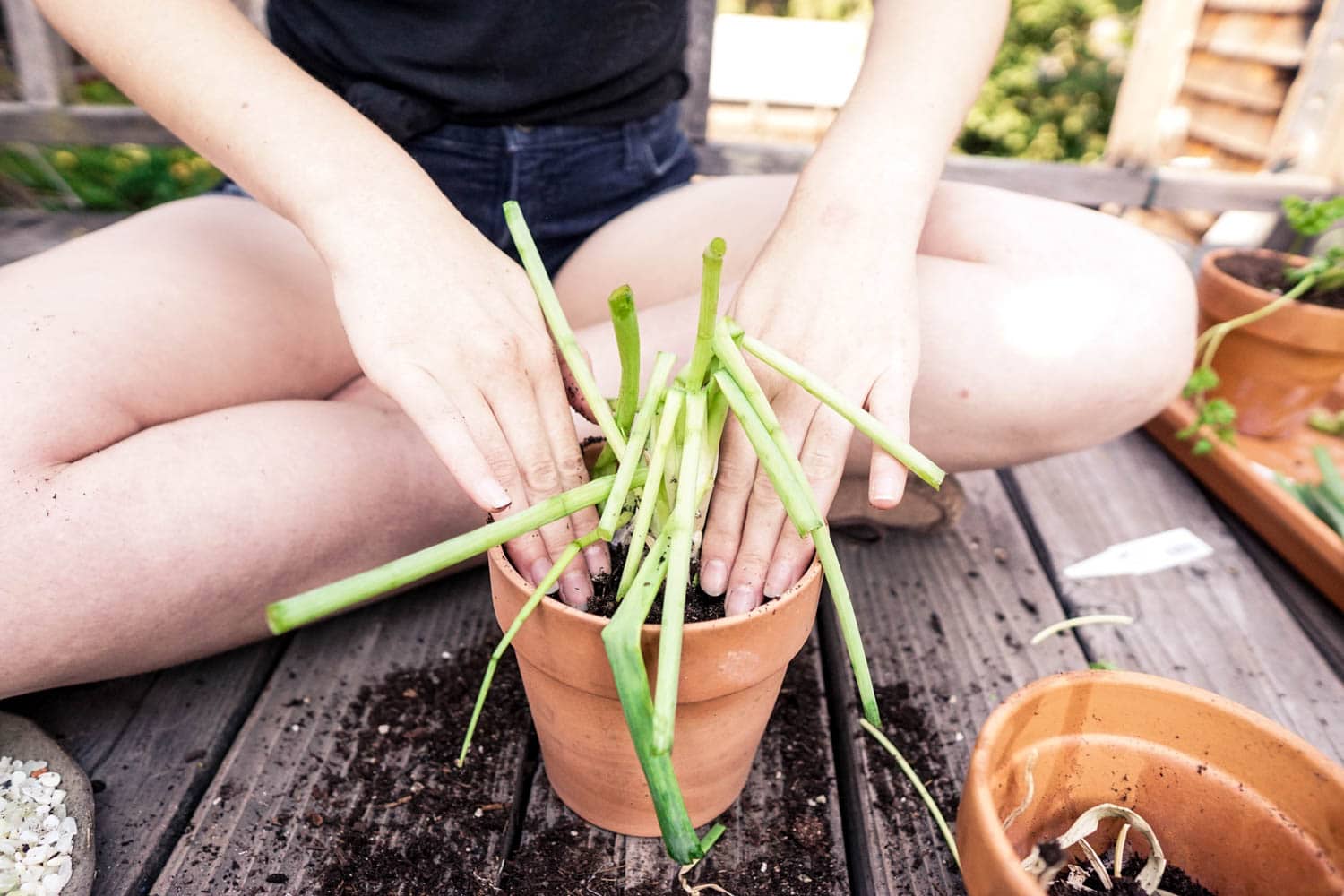
buy secondhand:
Always go thrift shopping before buying new. That’s my motto.
When you buy secondhand, you’re keeping perfectly good items out of a landfill. Not to mention, you’re also saving money!
Buying new, even if the product is sustainable, runs into a lot of money!
Not everyone can afford to spend $150 on one single dress.
Instead, checking out your local thrift stores will totally help save you some cash.
Plus, you’ll be supporting your local economy. It’s honestly a win-win-win situation.
There are so many cute things you can get at thrift stores.
I personally love shopping at Good Will because you can grab some really cute pieces for around $8 a pop.
Related: 6 Tips for Mastering Secondhand Shopping

cook from scratch:
If you’re constantly ordering takeout, you might notice that your personal savings is starting to shrink.
That’s because ordering food every night adds up!
It’s okay to order takeout every once and a while.
In fact, you can even do it zero waste style. But it shouldn’t be an everyday occurrence.
You’ll save a lot more money when you cook meals from scratch.
Making a meal plan can really help you with this. You don’t even have to be an amazing cook to do it.
Go to the grocery store, or better yet, the farmers market, and grab a bunch of produce you can use throughout the week.
Think in terms of breakfast, lunch, and dinner.
Make sure you grab enough for everyone in your household and avoid foods people don’t like to prevent any waste.
Then, cook it all using your favorite recipes.
I have a ton of yummy, zero waste recipes in my ebook How to Reduce Food Waste that can help you out.
Cooking your meals from scratch will not only be better for you and your wallet, but also the planet.
When you use whole foods, purchased plastic free and pesticide free, you’re avoiding so much packaging waste and supporting sustainable farming.
Related: How to Make a 5-Minute Meal Plan
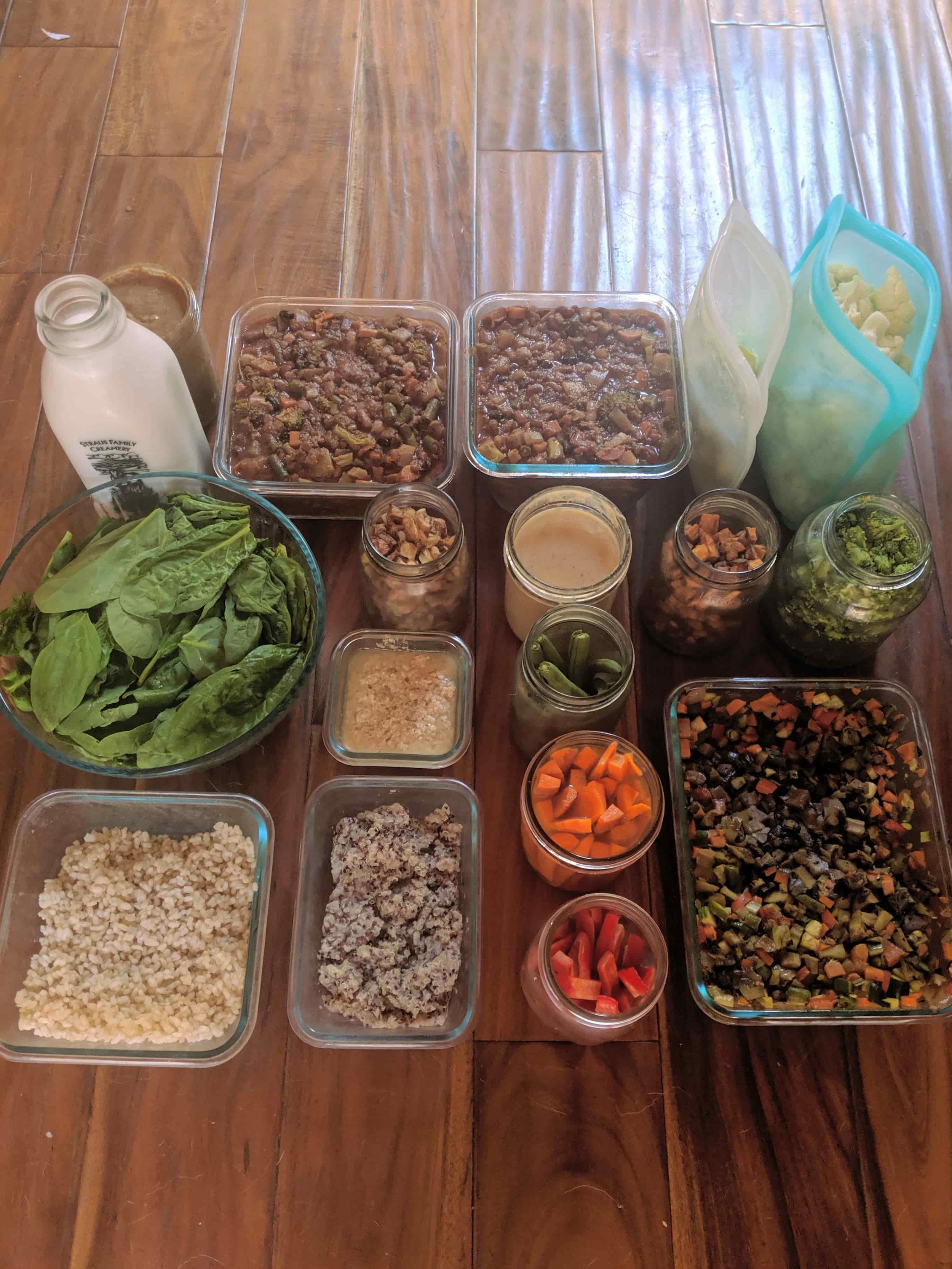
get a library card:
Are you a bookworm, like myself? You need to get a library card then.
Books can cost a lot of money!
Plus, yes, resources were technically wasted to create the books you love.
However, supporting your local library is a great example of a circular, sharing economy.
You can find all kinds of books on any subject for absolutely free.
And, if your library doesn’t have a specific book you need, you can always request they order it for you.
You’ll get a call or an email when the book is ready for pickup.
Sure, the library will charge you a fee if your book doesn’t get returned on time, but it’ll go straight towards supporting the library.
Plus, the fee is nothing in comparison to what an actual book would cost you.
There are also tons of other amazing resources the library has to offer.
From free classes to access to computers, you can find a wealth of free information all at your fingertips.
Plus, again, did I mention it’s all free?
Related: How to Find a Local Zero Waste Community

buy in bulk:
Bulk food shopping can help you cut back on waste and save a buck.
That’s because you’re not paying for the packaging, but the product.
At my bulk food store, I can grab six items in huge glass jars, all organic, for approximately $20.
If I were to buy those same organic items it in packaging, it would cost me a lot more than that.
Do yourself a favor and check out your local bulk food store. Not sure if you have one near you?
Here’s a bulk food locator that’s helped me in the past.
Health food stores are also great to check out because they usually have at least one aisle dedicated to bulk bins.
All you need to bring with you are glass jars, produce bags, a marker, and a wine bag with dividers.
You’ll need the marker to write the tare weight of the jar on your lid.
For more inspiration, check out the ultimate guide to zero waste grocery shopping.
If you have to get something in a container, always buy the biggest container you can get.
One big plastic bottle is a lot better than ten small plastic ones.
Plus, you can see it as an investment – it’ll last you much longer than the smaller container, resulting in less trips to the store.
Related: 15 Ways to Save Money on Real Food
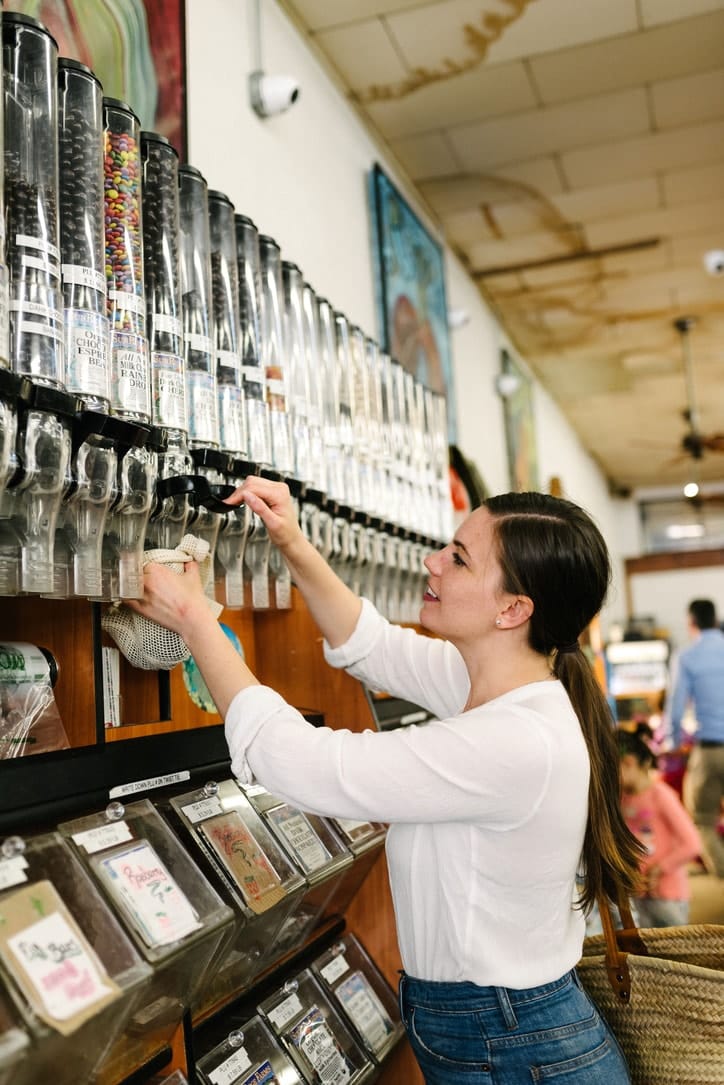
bike or walk:
Have a bicycle? Use it to get around instead of a car!
We’re all pretty aware of the fact cars produce emissions by now.
By walking or biking everywhere, you can kiss those emissions goodbye.
There’s also the matter of gas: If you still drive a gas-powered car, chances are you already know how quickly paying for gas can add up.
Not to mention any car repairs and car insurance!
The amount of money cars cost you just from having one really adds up.
That said, I’m not telling you to completely scrap your car. Instead, opt to walk or ride your bike more.
You’ll save more money on gas that way.
Choose a day to bike to work, if it’s close enough.
Or, opt to walk to the grocery store, if it’s a reasonable distance away.
Try to limit the amount you have to drive, especially while alone.
It’s always best to carpool with other people, as it saves you money whenever you have to pay a toll, and reduces emissions.
If all else fails, you can always use public transportation too.
This way, there will be less cars on the road, resulting in fewer emissions altogether.
Related: Are Electric Cars Bad for the Environment?
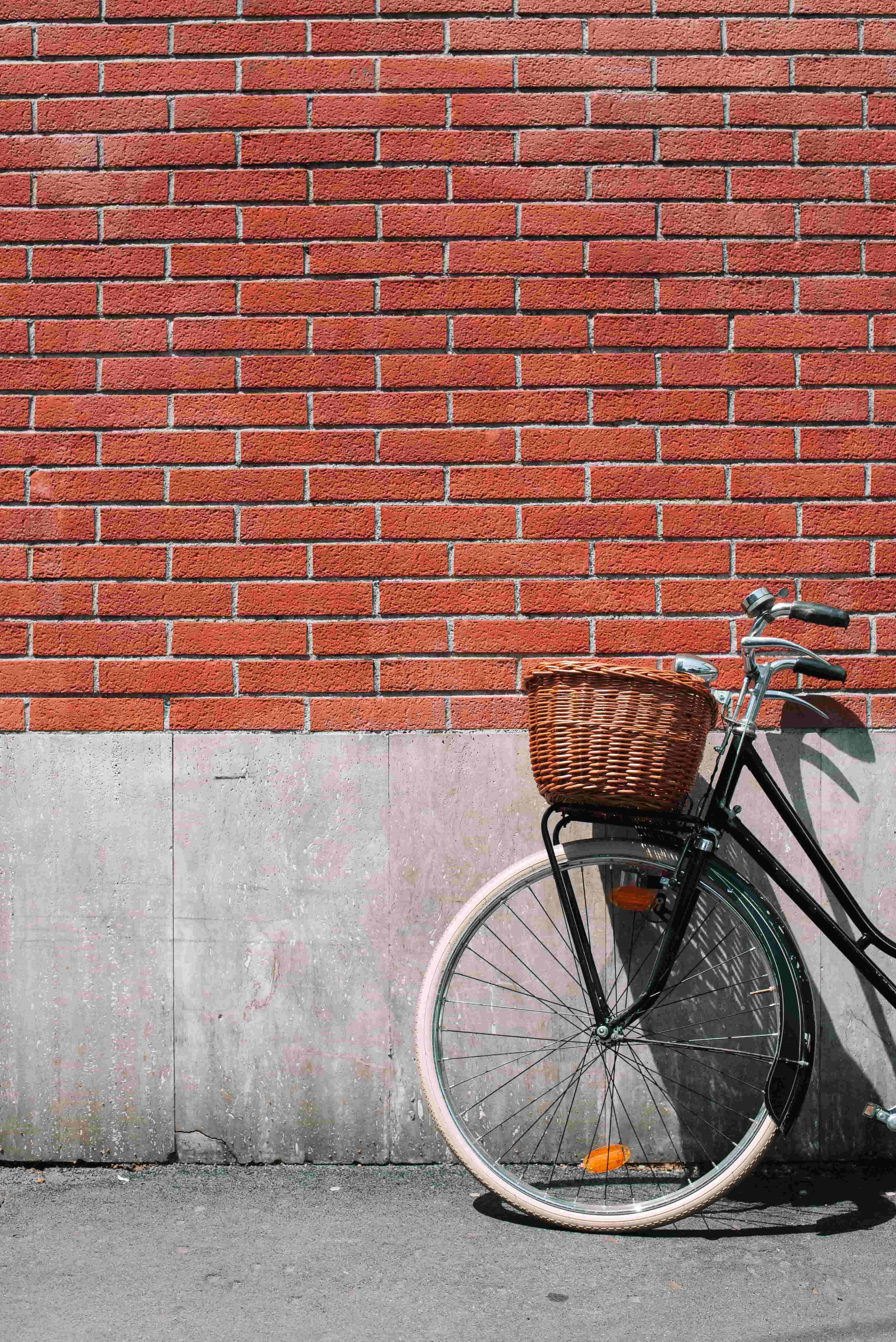
diy your cleaning routine:
One of the best ways to cut costs and help the earth is switching to DIY cleaning products.
I absolutely love this swap and recommend it to everyone!
I haven’t used conventional cleaners in forever, and I don’t miss them.
Natural, eco-friendly ones work just as well, if not better. And they don’t bother my ultra-sensitive nose!
My favorite DIY cleaner is definitely my orange peel vinegar cleaner.
It’s so multi-purpose, you can use it to clean just about anything and everything.
Plus, it smells like oranges!
All you need to make it is white vinegar and orange peels. Yes, that’s it. Oh, and a reusable spray bottle.
Don’t have oranges? Get creative and replace them with lavender, rosemary, pine, lemon, or mango.
Whatever fragrant plants you have on hand will work!
There are several other cleaning DIYs to try out too. Here’s a few of my favorites that are all low cost as well:
Lots of these products can be made using ingredients you probably already have lying around the house.
So, they’re really cheap and easy to make!
Plus, they last a long time, so you won’t have to make any more for a while.
How do you save money by living a greener life?
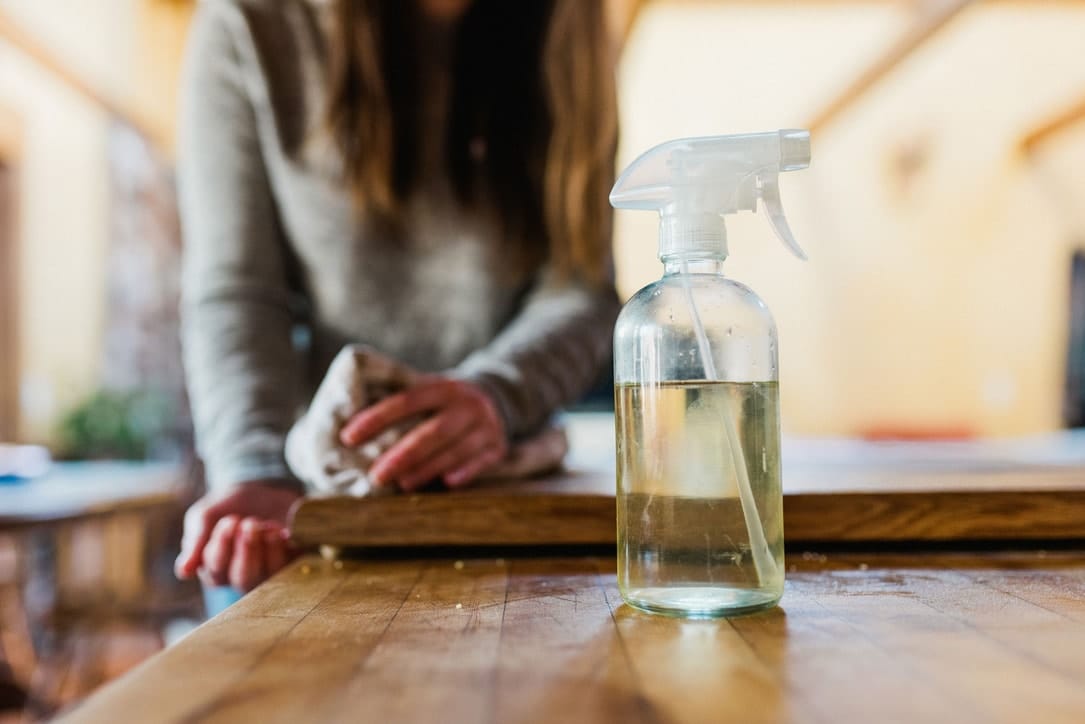
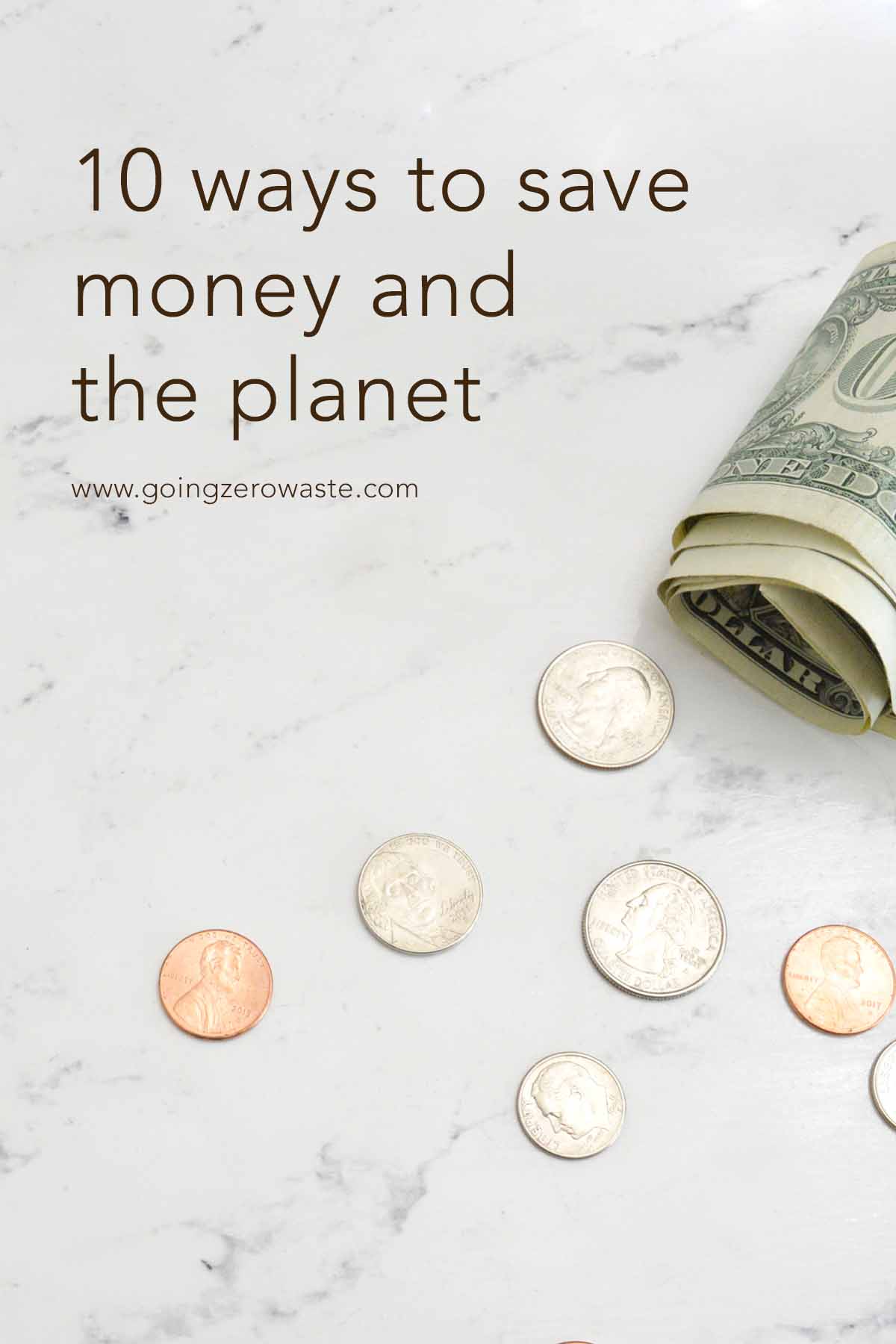
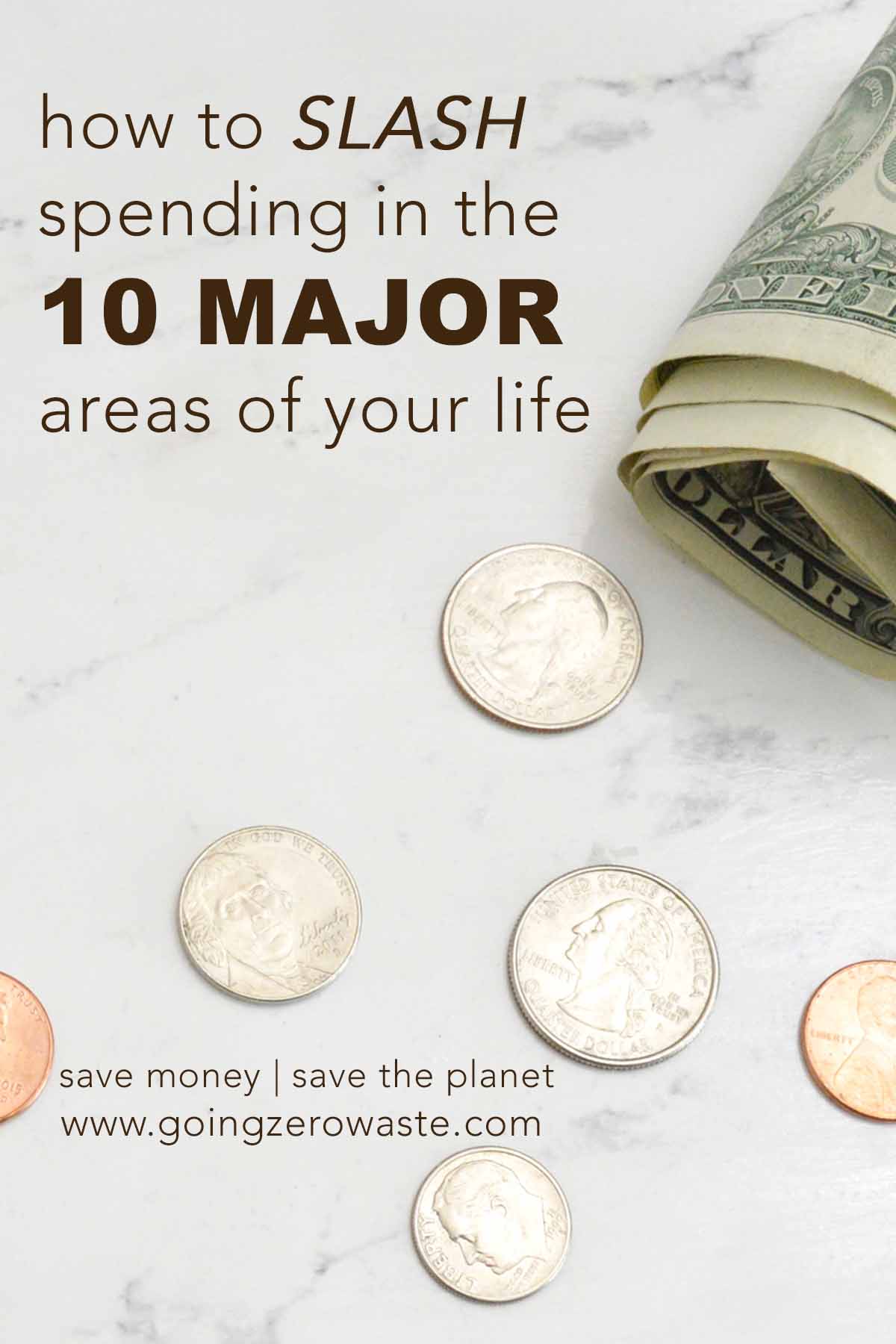



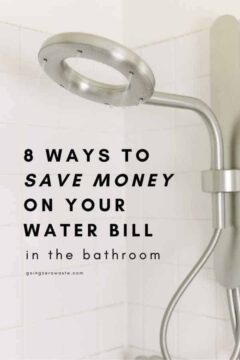








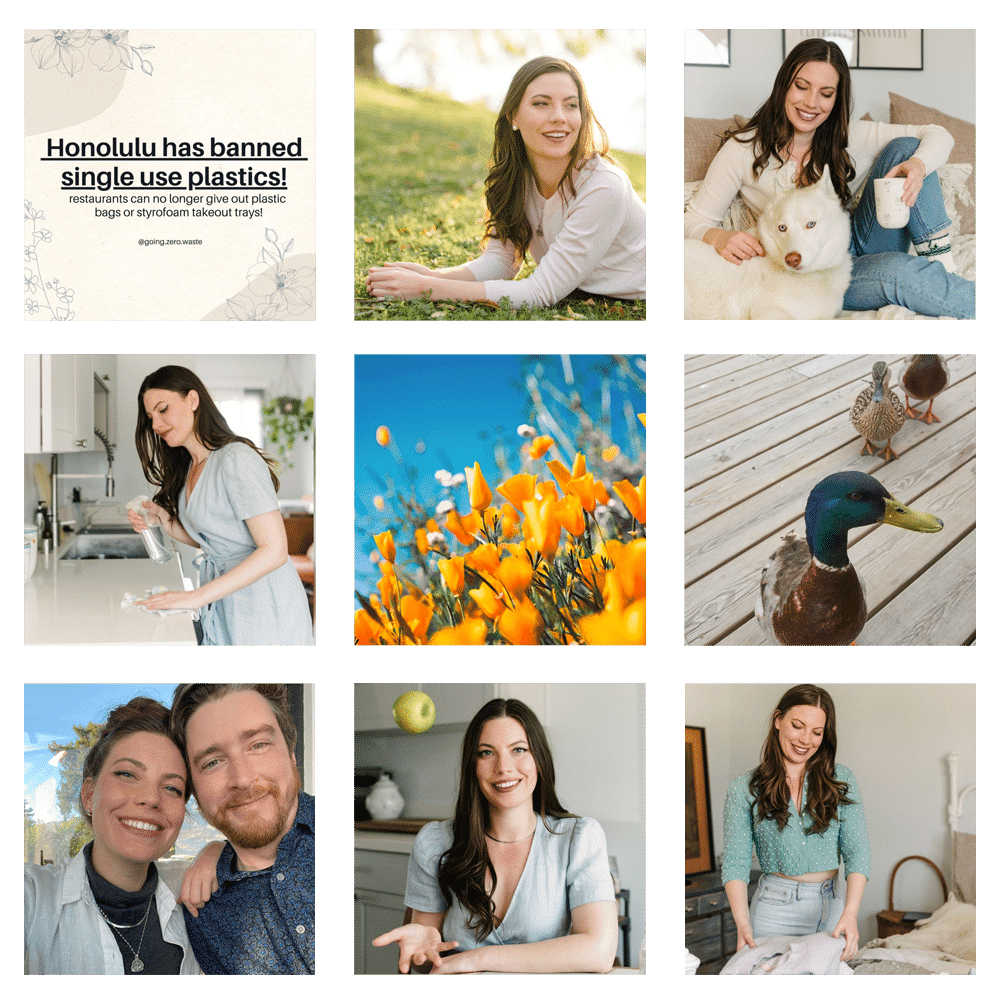
I simply love your blog!
I’ve always been wondering about how can I help this planet, me, only a little person among billions. And I’ve always been searching for ways to actually do something, because everything starts from one person. So now I’m trying your tips, I try to recycle (but I am not very successful at this, due to my community where the recycle bins or factories are almost non-existent), I’ve become vegetarian (not vegan… yet) and I try, with little steps, to save this planet and aware the others.
Thank you for your blog and keep going ’cause you’re doing a great job!
I don’t wash my clothes unless I really need to. If there are no stains or heavy sweat on an item I hang it overnight to air out, (except underwear and socks of course). I also made my own fabric refresher with two parts water, one part white vinegar and some lavender oil in a reusable glass spray bottle. (The vinegar replaces the vodka some people put in theirs as we don’t drink and don’t keep any on hand.) We pay per load of wash in our building and airing out saves money, water, and detergent.
We cook big on weekends and use the leftovers throughout the week so they don’t get wasted and we don’t have to use the big oven or stove every meal. Bones and veggies bits and pieces go into a bag in the freezer for stock, then composted after the stock is strained. Fortunately, my city takes bones as part of it’s food scrap program so they don’t go to landfill. Store bought stock is pricey!
Wow, I am so hooked, now. We just started our zero waste journey and this blog feels like discovering a gold mine. Very well written. I already spend a few hours reading all the amazing tips.
Thanks for all the info
I have never gone totally zero waste myself, but I have been through a lot of these action points on your list. To be honest, I think that the food part had the biggest impact for myself personally. If people just start to plan how much they will eat + invest in a small microwave, you will probably reduce your food waste by at least 50 %. Remember that I went to a birthday party where the host threw out (!) all the food after we had eaten, which almost shocked the guests.
I was like….we are in 2019, mate. Stop doing that.